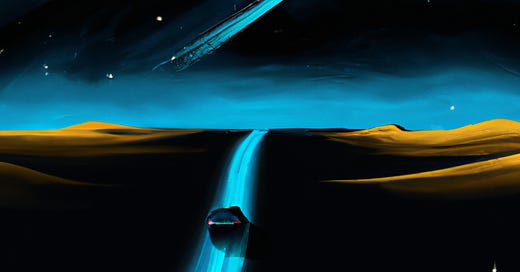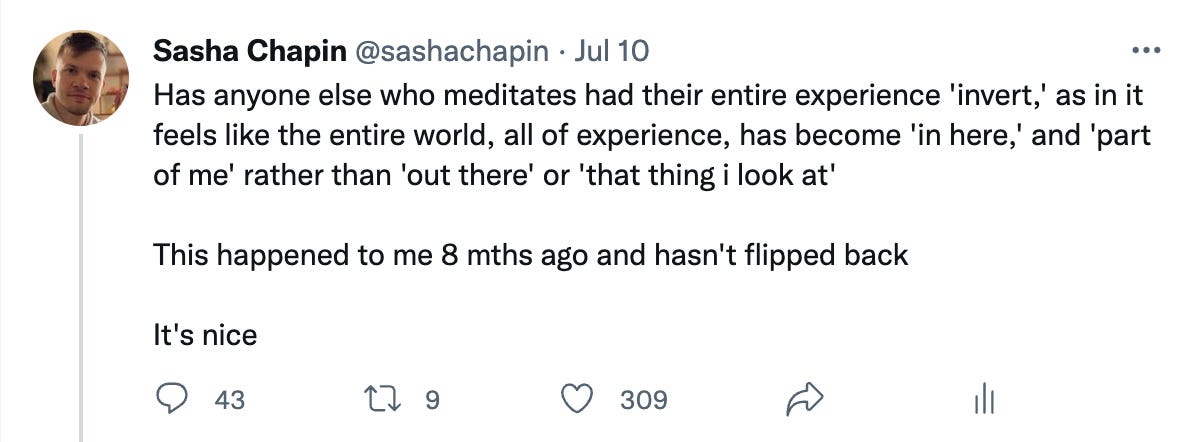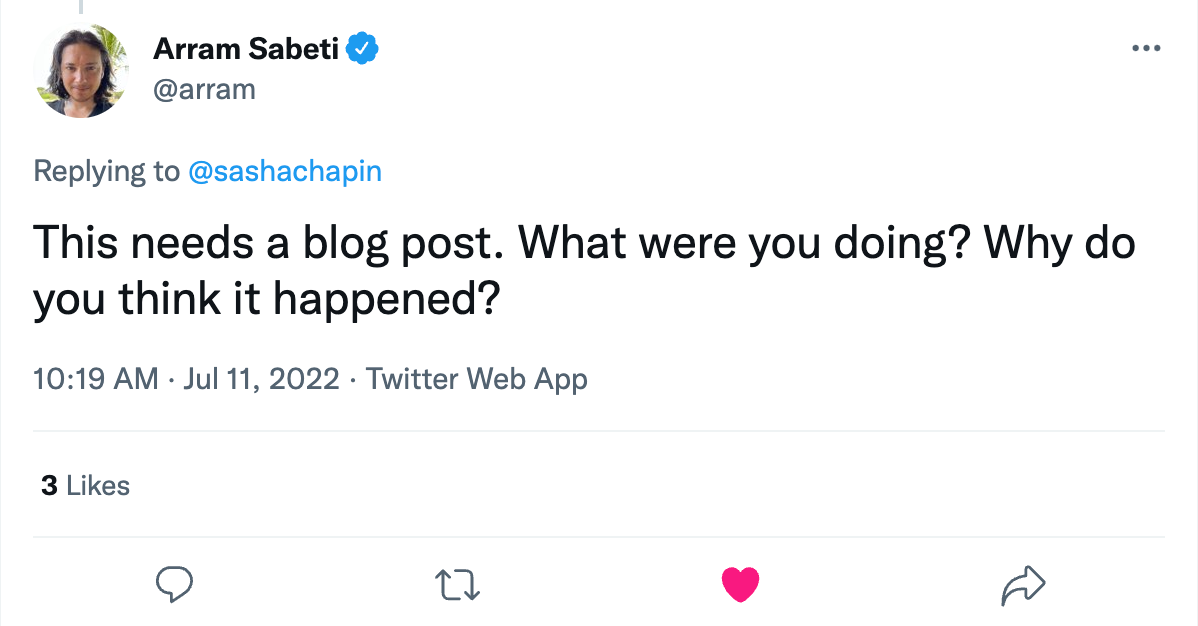In December 2021, something odd happened to me while meditating. It was also extremely pleasant, and it has persisted—it seems like a mental ‘software upgrade’. I don’t know that it’s altered my life in a measurable way from the outside, but, on the inside, it’s a definite evolution in how I experience the world.
I tweeted about it recently:
And there were some questions:
Okay, sure.
To make sense of it I have to set the scene a bit.
In my 20s, I’d done a lot of Zen-style meditation: the kind where you sit with half-open eyes and look at the wall for hours and don’t do anything. It lead me towards fascinating flavors of experience. Specifically, there were times at which the self/other boundary seemed to dissolve. For fleeting moments, I felt less like the guy behind the controls in my head, and more like the free-floating awareness centered on the pillow. This is, I believe, one dimension of what’s classically referred to as ‘non-dual experience.’
This was compelling and beautiful. However, at the time, I was also fucking depressed. My mind was a dangerous place in general. And when I ventured into that genre of experience, it seemed thrilling, but also stark, barren, terrifying. Fully going there, yielding to boundless emptiness, felt like it would represent surrendering myself to infinite despair. It had the ring of Kant’s description of sublime nature: “Bold, overhanging, and, as it were, threatening rocks, thunderclouds piled up the vault of heaven, borne along with flashes and peals … and the like, make our power of resistance of trifling moment in comparison with their might.”
Meditation was quite bad for me in general at this point. (This isn’t totally uncommon—here’s one great little post, of many that exist, on meditation risk.) So I stopped meditating and got my shit together. But I occasionally thought of those experiences of self/other dissolution with nostalgic fondness. Like, hey, remember that town we visited on our road trip? Non-dual town? I wonder if that cute gift shop is still there.
Nearly a decade later, in 2021, I was much less depressed. I’d done a lot of therapeutic work of various kinds and my mind felt like a much less dangerous place, and I’d started to have sustainable amounts of self-compassion. It was no longer plausible to me that a mental phenomenon encountered in meditation could destroy me.
As well, boosting my level of self-compassion made it much easier to achieve meditative concentration. Many of the swirling thoughts that assaulted me were of a self-critical nature—so, when it didn’t occur to me to criticize myself constantly, I didn’t have to compete with those thoughts anymore. This naturally lead me in the direction of more serious meditation practice—I started playing with jhanas, different kinds of open awareness, and basically whatever sound file looked good from Michael Taft or Rob Burbea.
And then I had to drive for ten hours one day, to Arizona and back, down lonely and uneventful stretches of highway, for a stupid reason that had to do with purchasing a house. This seemed like a perfect opportunity to try and see if I couldn’t revisit the self/other breakdown.
For nearly the entirety of the drive, I tried to relax out of a me-centered perspective. I attempted to look at my reality in a way that regarded everything as equivalently part of a larger awareness: bodily sensations, thoughts, clouds, gravel crunching beneath the tires, all equally me and not-me. I noticed how, just like my visual perceptions, all of what comprised my identity—flashes of identity, motive, drive—flickered and slithered and were essentially ephemeral.
This started feeling really good, like I was really getting somewhere—loosening my grip on a narrow perspective, sliding towards a more expansive way of being. But every time my state approached the self/other dissolution I was trying to slip into, I got excited, and started, well, trying too hard—clinging to an element of the experience rather than just letting it organically obtain. This frustrated me until I just decided to roll with it: I tried to include the excitement about the experience as another element to be regarded as both me and not-me. That step took me a little further.
This was about the ninth hour of the drive; I had come back from Arizona and was returning to California, and it was the dead of night in the high desert. I was a little dazed. My consciousness felt wider, looser, and more dreamlike than usual. There was a hard-to-pin-down sense that I was on a mental threshold, kind of a tip-of-the-tongue feeling, or like the feeling when you’re listening to music and you know the chorus is coming but you don’t know exactly when.
I took a break from actively meditating. But I wanted to keep thinking about it, so I put on a playlist of Rob Burbea talks I’d assembled. It started halfway through a talk he was giving on imaginative meditation instructions, and, within a couple of minutes, he suggested, “imagine yourself as luminous emptiness.”
I tried that, for a second. It only took a second. Somehow that phrase allowed everything I’d been assembling to click into place.
I disappeared from the car. I was no longer there. The reference point of ‘me’ popped out of existence. There was no essential separation between my hand, the wheel, the car, the road, the sky, the universe. And yet I could still drive. I drove myself through myself until I got home.
This sensation lessened in intensity but never went away.
It’s tough to describe. But a nice visual metaphor, which I’m borrowing from this paper about Zen phenomenology, is the Necker cube—that cube that looks either like it’s protruding inwards or outwards depending on how you see it.
It’s like that. The contents of reality are the same. But the perspective is different. My experience pops inwards now, whether visual, aural, emotional, sensual, or otherwise. I encompass, rather than observe.
During the season in which this occurred, I spent a lot of time working on myself in a number of dimensions: therapeutic, physical, and contemplative. So it’s hard for me to tell whether some accompanying mental changes resulted specifically from this perspective switch, or whether there was just other stuff going on.
However, my sense is that being less stuck inside myself phenomenologically generalizes to a greater sense of belongingness to everything else. I move through the world a little more easily and connect to others a little more easily. Emotions feel both larger and also more manageably fluid. Everything flows more.
But even if I’m wrong, and all of those benefits aren’t linked to this inversion moment, I can definitively say that it’s a prettier way of existing. It’s just much nicer when I am a part of my world-model, rather than the whole of it. It’s great when someone else I’m relating to feels like a primary part of my existence, rather than a fixture. It’s pleasant to have you in here.
There’s another weird, good thing that happened to me in my meditation practice subsequently. If you all want to hear about it I’ll write another post of this genre next week.







This transition is fairly ubiquitous among serious meditators; the realization of non-separation is an explicit objective of many if not most schools of meditation. I don't mean to trivialize your attainment here, in fact i think it's very worthy of celebration, just wanted to emphasize that you're not at all alone in this. In the context of nondual spirituality, your experience isn't odd, rather it's the whole point.
Whoa, fascinating. I would love to hear the other weird good thing!